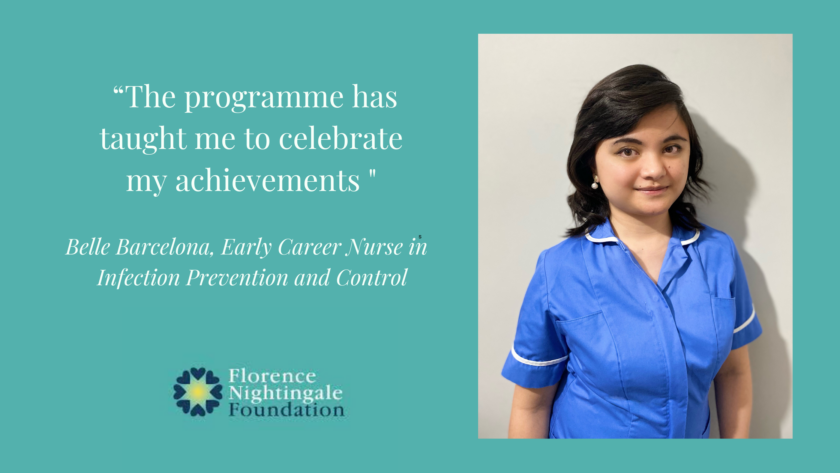
My name is Jeribelle Moltio Barcelona – but I am fondly called Belle by my colleagues and patients. I am an early career nurse in the Infection Prevention and Control Team at the Royal Berkshire Hospital. Growing up, I always had a dream to create positive change and make a legacy. My desire to impact people around me and to ignite and inspire by helping others fitted the definition of being a nurse. My decision in choosing my profession was greatly influenced by my aunt who was also a UK nurse.
Joining the NHS
I started my career in the NHS with the Royal Berkshire Hospital on December 2020 at the height of the pandemic’s second wave. During this time, I was assigned to a hip fracture unit which was then converted to a COVID ward. I had to exhibit grace under pressure and learn the ropes of the system while ensuring quality service delivery. After seven months in this unit, I decided to venture further in my nursing career and started a new role with the Infection Prevention and Control Team.
My training was very rigid and strenuous but I have come to enjoy every bit of my profession. Through nursing, I have been able to touch the lives not only of patients but also colleagues and future nurses. My profession has also allowed me to continuously learn and develop myself. Moreover, I appreciate how nursing is a profession which has evolved. It offers a broad spectrum of specialties which allows us to innovate and impact health care in different domains.
Becoming an FNF Alumni
I was fortunate to be one of 23 nurses and midwives selected for the most recent Sandra Charitable Trust: Early Career Nurse and Midwife Leadership Programme. It was phenomenal! Being a FNF alumni has always been a dream even before I set foot in the UK. I have always desired to be part of Florence’s legacy and be trained under the Foundation’s leadership programme. I’ve always wanted to do this programme ever since I was in the Philippines. It’s been on my bucket list! One of the Filippino nurses, Francis Fernando, wrote a blog about it and I got really interested – I was like, wow, I want to be in one of those leadership programmes. It sounded like it was transformational.
The programme has allowed me to discover my personality and leadership style which I believe is very important in setting your grounds as a leader. Knowing your strengths and weaknesses will help you plan and develop as you engage with other people and deal with difficult and challenging situations. Every session was filled with learning and discovery. It has definitely helped to build my self-confidence – the Foundation teaches that becoming a leader is not limited to senior positions. It motivates you to progress your career and have a wider reach.
My QI Project
My QI project focuses on patient safety by improving communication through a standardised handover method. My aim is to promote written documentation in conjunction with verbal handovers. With this, I have formulated an ABCD checklist (Assessments, Bloods and Other Diagnostics, Collaborative and Discharge Plan) as a method of handover in the ward. Feedback from stakeholders revealed satisfaction with the checklist and the ability to gain situational awareness on every patient plan. It also revealed the following improvements in the patient care process: rapid referral and follow-up; avoid redundancies in diagnostic tests and referral; easy-to-facilitate discharge plans; continuity of care; easy reference.
“You are already a leader”
I remember hearing this remark from a fellow colleague while doing the programme. As an early career nurse, it was reassuring and impactful to hear this. Aspiring future nurses and colleagues have been inspired by how the programme has changed me and how driven I am. It has made them more engaged and interested in the Foundation’s leadership programmes and inspired them to innovate and advocate for change to improve quality nursing and health care delivery.
Every session I had was equally important but RADA is definitely my favourite! It is common for early career nurses to struggle with confidence and presence. This session will give you all the leadership advice you need to breathe and be composed even in the most chaotic situation. I was a very shy person. I wouldn’t really talk or present myself and I do more now because of the leadership programme.
The programme has encouraged me to find my own niche in order to be more excellent in my profession. A month after starting, I applied for a senior staff nurse position in the Infection Prevention and Control team. As an early career nurse, I have self-doubts. But while applying for my current role, I decided to highlight my potential, my passion and my achievements. This is another significant lesson from the programme. We have our own vulnerabilities and sometimes we tend to believe that our achievements are not worth celebrating. The programme has taught me to celebrate them, to be proud of my star moments, and to be comfortable talking about them with other people.